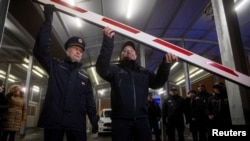Bulgarians and Romanians celebrated the lifting of European Union land border controls as the two EU members gained full entry into the bloc’s free-travel Schengen Zone.
Fireworks lit up the sky at the border crossing near the Bulgarian town of Ruse just after midnight on January 1 as the interior ministers from the two countries symbolically raised a gate on the Friendship Bridge across the Danube River.
Romanian authorities said they will scrap 39 border crossing posts between it and Hungary and Bulgaria.
Though both Romania and Bulgaria have been members of the European Union since 2007, they were still subject to visa requirements across the EU. Objections from Austria, which argued that the two countries were not doing enough to stem illegal migration, had held up the process for years.
Joining the Schengen Zone now means citizens can now cross borders, neighboring and further afield, without passport checks.
Romania pledged to continue conducting random spot checks of identification documents to monitor illegal migration.
"This is a historic moment," said Bulgarian Prime Minister Dimitar Glavchev who symbolically splashed water at the border checkpoint at Kulata. "From Greece in the south to Finland to the north and all the way to Portugal to the west -- you can travel without borders."
The Schengen area now covers 25 of the 27 EU member states, as well as Iceland, Liechtenstein, Norway, and Switzerland.









